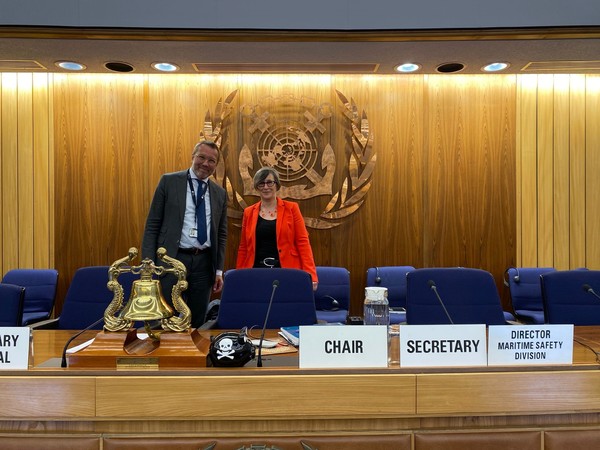The 108th session of the Maritime Safety Committee took place in London from 15-24 May 2024. IUMI used the opportunity to present an update on marine insurance and casualty trends. The presentation was given by Astrid Seltmann, Analyst at Cefor and Vice Chair, IUMI Facts & Figures Committee. Astrid’s presentation can be accessed here. IUMI Secretary General Lars Lange moderated the session.
Key issues addressed during the meeting included:
Development of a goal-based instrument for Maritime Autonomous Surface Ships (MASS)
A Working Group was established to further develop the draft non-mandatory MASS Code. Progress made in the Group on the development of the Code included some re-structuring, moving various chapters among the three parts of the Code to ensure that each chapter of the Code was in the right part, to meet the agreed purpose of the respective part. The use of the term "MASS" was discussed and whether, when referring to a ship to which the MASS Code is applied, the term "ship" should instead be used, which may be in appropriate in cases where "MASS" referred to remote operations centre (ROC), and thus requiring further consideration.
MSC 108 agreed to the application provision of the draft Code, which stated that the Code applies to cargo ships to which SOLAS chapter I applied, except, not only cargo high speed craft, but also, in principle, ships owned or operated by a Government, and when Administrations deem that compliance with base instruments is not practicable.
Regarding the role of the master, and, in particular, whether a master should be on board when other persons are on board, the Group agreed that in such cases the master needed to be on board to ensure the safety of the persons on board and to exercise the master's overriding authority.
The finalisation and adoption of the non-mandatory MASS Code is planned for MSC 110, followed by an experience-building phase. It would hence not be possible to achieve the 2026 adoption deadline for a mandatory Code. Therefore, the earliest possible entry into force would be on 1 January 2032
Safety regulatory framework to support the reduction of GHG emissions from ships
MSC 107 had agreed to include in the biennial agenda for 2024-2025 of the Committee a continuous output on "Development of a safety regulatory framework to support the reduction of GHG emissions from ships using new technologies and alternative fuels". A Working Group on this agenda item was established which updated the list of alternative fuels and new technologies and continued the assessment for each identified fuel and new technology. Safety obstacles and gaps in the current IMO instruments were identified that may impede the use of the alternative fuels or new technologies. A discussion on challenges or difficulties encountered in connection to ship design, ship building, structural adaption in existing ships and fuel supplying to accommodate new technologies and alternative fuels was initiated. It was discussed how relevant sub-committees are to be involved in the work and whether the development of IMO instruments for all new fuels and technologies were necessary.
IUMI had participated in the Correspondence Group on this agenda item which preceded MSC 108 and will participate in the CG which will be re-established after MSC 108.
Revision of the Guidelines on Maritime Cyber Risk Management (MSC-FAL.1/Circ.3/Rev.2) and next steps to enhance maritime cybersecurity
A Drafting Group was established which considered a consolidated proposed revision of the Guidelines on maritime cyber risk management as the base document to finalize the text of the guidelines. During the discussions a question was raised over whether the term "shipping" in section 1 of the Guidelines should be expanded to refer to the "maritime industry" or "maritime transport". The Group, having agreed on the need for consistency with ISM Code, agreed to use the term "ships".
There was also discussion in the Group regarding the potential inclusion of a definition of "Information Communications Technology" (ICT) under paragraph 2.1 "Key definitions". Although ICT is referred to in document MSC 108/6, as it was not referenced in the proposed revised Guidelines, the Group concluded that it was unnecessary to include such a definition.
The issue whether the intention was for Senior Management to undertake relevant cybersecurity training was raised. The Group agreed to keep the text as proposed as this was in line with the International Safety Management Code.
The draft Guidelines were approved by MSC 108.
Maritime security
An MSC resolution on the Security situation in the Red Sea and Gulf of Aden resulting from Houthi attacks on commercial ships and seafarers was approved by the Committee.
New outputs
Due to the significant workload of the MSC, the Committee decided to continue its moratorium on new agenda items until at least after MSC 109 (December 2024). This affects IUMI as we were planning to submit a joint paper with IACS on the issue of fires caused by low-pressure fuel pipes.
